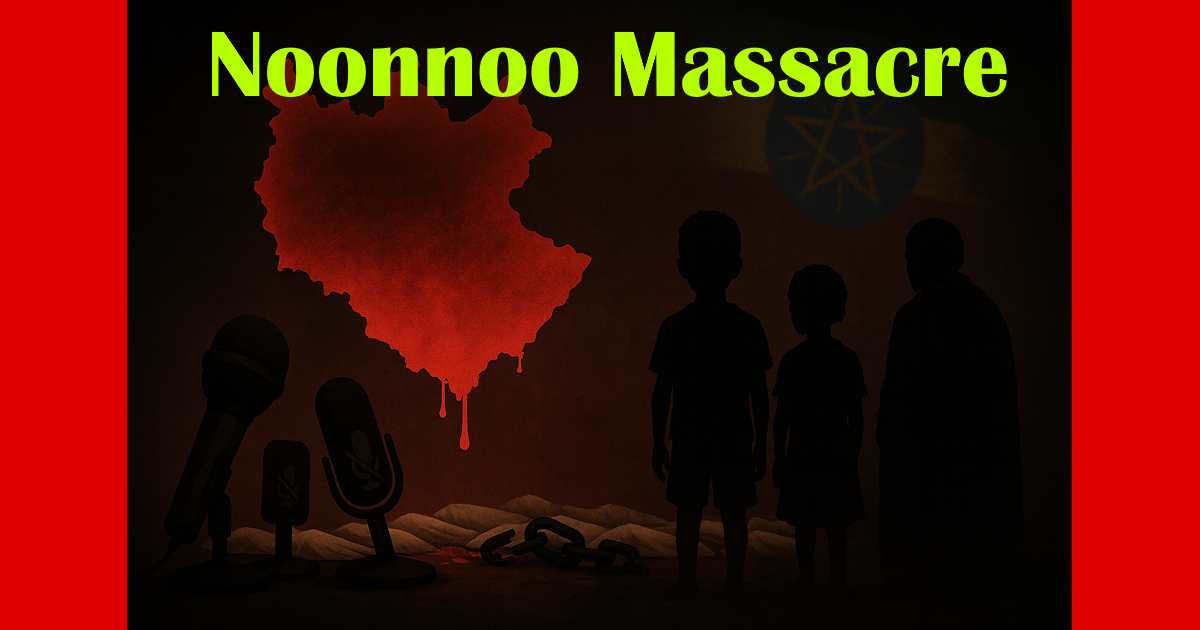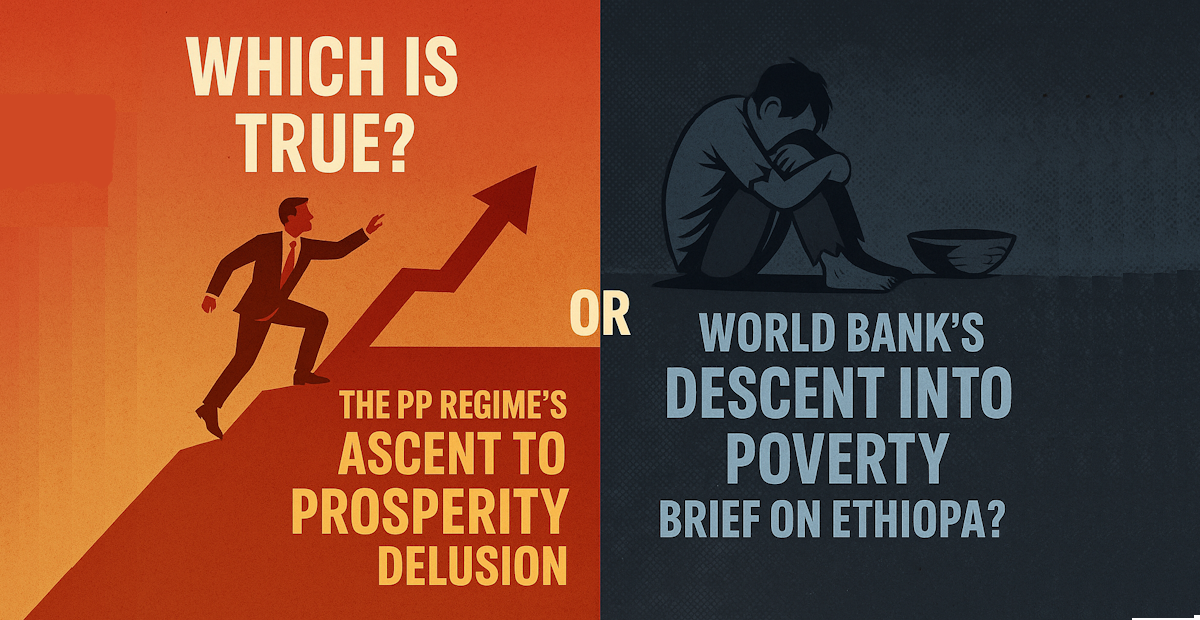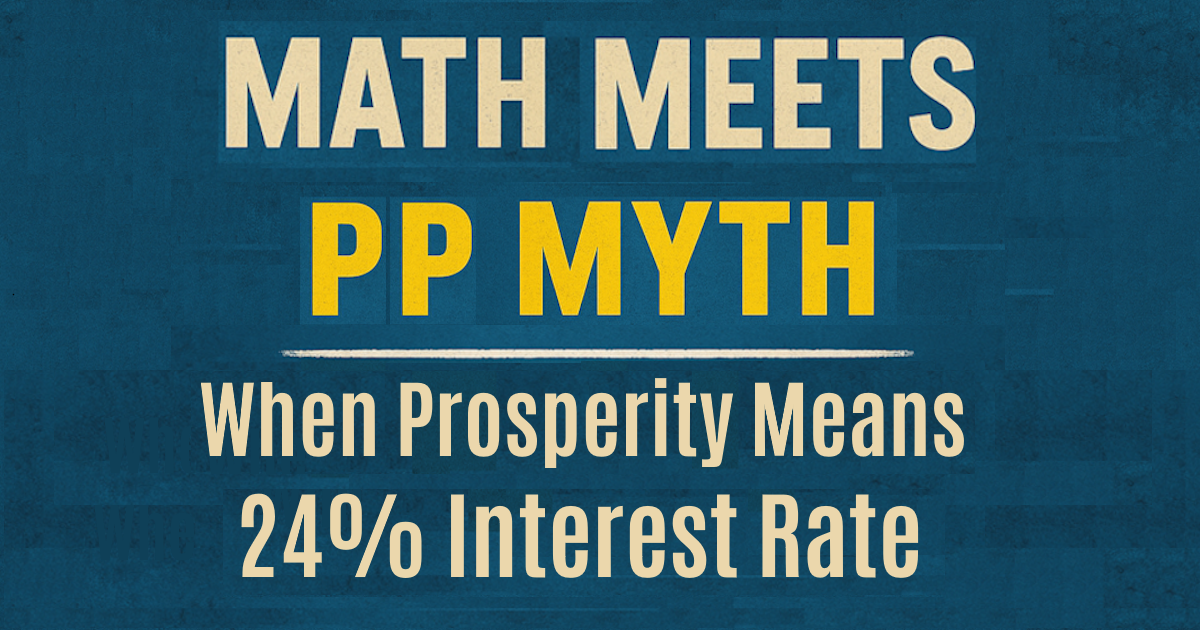How Ethiopia's Regime Is Squandering Billions It Cannot Afford to Cling to Power Cyber Trolls—The Regime’s Costly Propaganda Warfare

Excerpt:
Ethiopia is now well known for squandering billions on trivial projects while the citizens in millions are hurting. The regime pays cyber trolls more than doctors — perhaps at a ten-to-one ratio — builds palaces while hospitals collapse, and fights dissent harder than it fights poverty. This is an empire betrayed from within.
Ethiopia stands at the bottom rung of the global economic ladder, with millions of its citizens living below the breadline. Yet, the regime continues to squander billions on vanity projects that serve little purpose beyond spectacle and regime glorification.
Squandering Billions
Among these is the infamous “Caakkaa Project,” the extravagant multi-billion dollar palace being erected atop the hills of Eekkaa, gazing down arrogantly on the impoverished capital.
If there were ever solid proof that Prime Minister Abiy Ahmed has no intention of relinquishing power anytime soon, this would be it. He is not building it for the people—he is building it for himself. And when questioned, he responds with absurd claims that it’s not public money, as though the funds materialized from thin air. Could they, perhaps, have trickled back through UAE channels from the Laga Dambii gold holds?
This palace is but one tile in a mosaic of misallocated priorities. The regime has spent fortunes on Finfinnee’s street lighting and endless park projects, aesthetic indulgences masquerading as development.
The latest, only days ago, in this parade of extravagance: a spectacle of thousands of drones lighting up the sky—not to save lives, not to boost agriculture, not to address famine or inflation—but to simulate what looks like a glorified dot-matrix printer from the 1980s, only this time using drones as LED lights in the sky, and under the guise of Ethiopia Tech Expo 2025. All for ego — a lavish, taxpayer-funded toy exhibition with no return.
Meanwhile, the empire bleeds.
Doctors are on strike. Teachers suffer in silence. Nurses, civil servants, and other professionals survive on a monthly salary in four digits—barely enough for a single lunch at one of the luxury hotels where Prosperity Party officials dine. The government’s response? Dismissal, arrogance, and arrests. Thousands of doctors have already faced detention, and others are only restrained from protest by fear of the omnipresent security apparatus.
The suffering we see may only be the tip of the iceberg—perhaps just 1% of the pain, as revealed by the courage of striking doctors. The rest remains buried in fear and silence.
And yet, there is one more domain of public wealth being siphoned out of sight, one more tale of regime betrayal yet to be exposed.
The Multi-Billion Surveillance Machinery
But perhaps the most brazen waste, yet another Squandering Billions, is hidden not in concrete palaces or LED-lit skies, but in the shadows of cyberspace — in the form of the regime’s surveillance machinery under the guise of cyber security and antiterrorism.
Ethiopia’s surveillance apparatus is anchored in the Information Network Security Agency (INSA), established in 1999 with U.S. assistance for counterterrorism purposes. Today, it operates directly under the Prime Minister’s authority and is deeply implicated in the surveillance of dissidents — particularly within the diaspora — using sophisticated intrusion software and digital tracking. INSA’s tools have reportedly been used to level charges of treason and terrorism against journalists, opposition figures, and civil society actors.
Regime’s Faarseebulaa Cyber Trolls
The term Faarseebulaa, in Afan Oromo, is deeply telling. Just as Qoteebulaa refers to one who makes a living by ploughing the land, faarseebulaa describes those who survive by praising the regime for a living — a new class of digital serfs, cultivating deception and obedience in cyberspace instead of soil.
There is no perfect English equivalent, for even terms like Troll Farms or Cyber Militias offer these individuals an undeserved layer of abstraction. In reality, Faarseebulaas are crude, coordinated, and well-funded — often operating with state support.
INSA operates within a blurred ecosystem — where formal intelligence, state-aligned paid cyber trolls, and the emerging Faarseebulaa are difficult to disentangle.
The dedicated and paid cyber trolls earn monthly salaries in the six-digit Birr range, comparable to a bank CEO in a country, where civil servants starve on wages barely enough to cover a single week’s groceries. Most Faarseebulaas stand out as voluntary digital Serf who are usually rewarded in kind: early business tips, relaxed permit approvals, or praise from powerful figures. Together with the paid cyber trolls (who work in silence), their mission: to hound truth-tellers in diaspora, for instance, from Oromo groups, individuals like (in first name alphabetical): Eskiel Gabissa, Itana Habte, Jawar Mohammed, Milkessa Gamachu, Taye Dendea Aredo, Tsegaye Ararsaa, and more.
Their tactic: smearing reputations, distorting facts, flooding timelines, and silencing dissent through noise. What is most galling is not just the existence of this digital army — but its cost of the intelligence and propaganda ecosystem.
These low-IQ agents of propaganda, now supercharged with AI-generated audio, video, and manipulated graphics. And they are not few. There are thousands of them, operating around the clock, around the globe. Using fake profiles, identity laundering, and mass spamming tactics, they create the illusion of public consensus — a manufactured echo chamber of loyalty.
Ethiopia’s regime pays trolls to smear activists, while truth-tellers get shut down. Where is Facebook — swift to silence truth-tellers through account closure, yet deafeningly silent on Ethiopia’s multi-million budget Faarseebulaa cyber troll army? @Meta where are your policies now?
#FacebookDoubleStandards
#CyberTrolls
#DigitalRights
This phenomenon is not unique to Ethiopia. China has its “50 Cent Party” (五毛党), so named as cyber trolls are paid half a yuan per post to defend the state. Russia’s infamous Internet Research Agency spawned a whole new language around cyber warfare and digital infiltration.
But unlike these nuclear-armed giants, Ethiopia is an entity on economic life support. It simply cannot afford — and ethically must not justify — pouring scarce resources into repression rather than relief.
In Conclusion
When hospitals are shutting down, doctors are being jailed, and students go hungry, should we really be funding battalions of Faarseebulaas to troll citizens into silence?
It is a question that pierces the conscience of any still capable of moral reflection. The choice is stark: rescue the people or reinforce the power structure; channeling resources wisely or squandering billions.
Ethiopia is bleeding. And history will remember whether those in power chose to dress the wound — or to decorate the throne. Squandering billions
Related References
- A TikTok Page Depicting LED Matrix Text Lit by Drones in the Sky.
- Editorial, Clapping for Lies in Ethiopian Politics: A Reckoning for Ethiopia’s Belly-Politicians, 17 May 2025, OROMIA TODAY.
- Editorial, An Open Letter to the Caffee Oromia: Fulfill Your Sacred Mandate, 15 May 2025, OROMIA TODAY.
- Albert Cevallos, How Autocrats Weaponize AI — And How to Fight Back, March 2025, Journal of Democracy.






